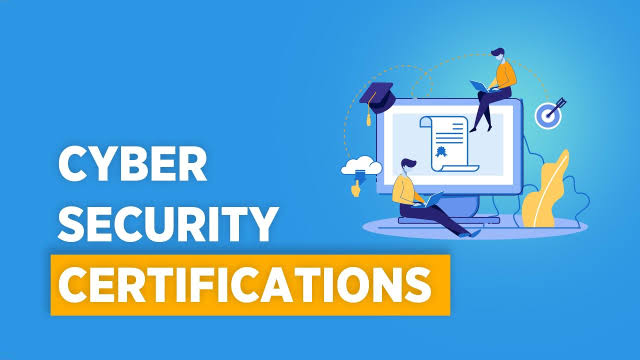These certifications represent the top credentials in cybersecurity, each offering unique benefits and opportunities for professionals aiming to excel in safeguarding digital assets and mitigating cyber threats.
Certainly! Here's the text without any formatting:
---
Top 10 Cybersecurity Certifications for Professionals
Cybersecurity certifications are crucial for professionals looking to validate their skills, advance their careers, and stay competitive in the rapidly evolving field of cybersecurity. These certifications demonstrate expertise in various domains of cybersecurity, from ethical hacking and incident response to risk management and governance. Choosing the right certification can depend on career goals, specialization areas, and industry requirements. Here’s an overview of the top 10 cybersecurity certifications that professionals should consider:
1. Certified Information Systems Security Professional (CISSP)
CISSP is one of the most recognized certifications for cybersecurity professionals globally. Offered by (ISC)², CISSP validates expertise in cybersecurity management, risk assessment, and governance. The certification covers eight domains, including security and risk management, asset security, security engineering, and communication and network security. CISSP is ideal for experienced professionals aiming for roles such as security manager, consultant, or chief information security officer (CISO).
2. Certified Ethical Hacker (CEH)
CEH, provided by the EC-Council, certifies individuals in ethical hacking techniques and tools commonly used by malicious hackers. The certification covers areas like footprinting and reconnaissance, scanning networks, enumeration, system hacking, and web application penetration testing. CEH is valuable for professionals involved in penetration testing, vulnerability assessment, and security auditing roles.
3. Certified Information Security Manager (CISM)
CISM, also offered by (ISC)², focuses on information risk management and governance. It validates expertise in developing and managing an enterprise information security program. The certification covers four domains: information security governance, risk management, information security program development and management, and incident management and response. CISM is suitable for professionals aspiring to lead information security teams or manage cybersecurity programs.
4. Certified Information Systems Auditor (CISA)
CISA, administered by ISACA, certifies professionals in auditing, controlling, monitoring, and assessing information technology and business systems. The certification covers domains such as information system audit process, governance and management of IT, information systems acquisition, development and implementation, and protection of information assets. CISA is ideal for auditors, consultants, and IT security professionals involved in auditing, control, and assurance roles.
5. CompTIA Security+
CompTIA Security+ is a vendor-neutral certification that validates foundational cybersecurity skills and knowledge. It covers topics such as threats, attacks, and vulnerabilities, technologies and tools, architecture and design, identity and access management, risk management, and cryptography. Security+ is suitable for entry-level cybersecurity professionals and serves as a stepping stone to more advanced certifications.
6. Certified Cloud Security Professional (CCSP)
CCSP, offered by (ISC)² in collaboration with Cloud Security Alliance (CSA), validates expertise in cloud security architecture, design, operations, and service orchestration. The certification covers domains including cloud concepts, architecture and design, cloud data security, and legal and compliance. CCSP is beneficial for professionals involved in cloud security architecture, operations, and governance within cloud environments.
7. Offensive Security Certified Professional (OSCP)
OSCP, provided by Offensive Security, is a hands-on certification focusing on penetration testing and ethical hacking skills. It assesses practical knowledge in areas such as information gathering, exploitation, privilege escalation, and post-exploitation techniques. OSCP certification holders are proficient in identifying and exploiting vulnerabilities in target systems, making it ideal for penetration testers and security professionals specializing in offensive security tactics.
8. Cisco Certified CyberOps Associate
Cisco CyberOps Associate certification validates skills in security monitoring, intrusion analysis, incident response, and cybersecurity operations. It covers topics like security monitoring tools, network intrusion analysis, endpoint threat analysis and computer forensics, incident response, and security policies and procedures. CyberOps Associate is suitable for cybersecurity analysts, SOC (Security Operations Center) analysts, and incident responders.
9. GIAC Security Essentials (GSEC)
GSEC, offered by the Global Information Assurance Certification (GIAC), validates knowledge in information security concepts, tools, and technologies. The certification covers domains such as access control, network security, cryptography, and security operations and incident response. GSEC is beneficial for security professionals seeking a broad understanding of information security and foundational skills in various domains.
10. Certified Information Privacy Professional (CIPP)
CIPP, provided by the International Association of Privacy Professionals (IAPP), certifies professionals in privacy laws, regulations, and best practices. It covers topics such as privacy fundamentals, principles of data protection, compliance and enforcement, and information risk management. CIPP certifications are available for multiple jurisdictions (e.g., US, Europe, Asia), making it suitable for professionals involved in privacy compliance and data protection roles.
Choosing the right cybersecurity certification depends on individual career goals, specialization areas within cybersecurity, and industry requirements. These top 10 certifications offer a range of expertise, from foundational knowledge to advanced skills in specific cybersecurity domains. By earning these certifications, cybersecurity professionals can enhance their knowledge, validate their skills, and advance their careers in the competitive field of cybersecurity.
